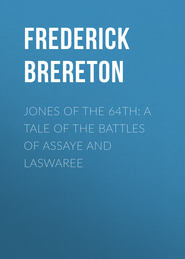По всем вопросам обращайтесь на: info@litportal.ru
(©) 2003-2024.
✖
Under the Star-Spangled Banner: A Tale of the Spanish-American War
Настройки чтения
Размер шрифта
Высота строк
Поля
Quitting the office, they struck across the yard and entered the shed, to find that the mold upon which Hal had been engaged was completed.
"All ready for the metal, sir," said the foreman.
"The top cover of Mr. Hal's wheel was slung on a few minutes ago, and it will be as good a job as we ever put out. What do yer say, sir?"
"I don't know that it will be as good as the castings usually turned out from here," Hal replied. "Still, I hope it will do us credit."
"That it will, sir. Joe finished it up when you and the guv' cleared off, and he said as it was the best he'd seen for many a day."
"Jack, boy, you can let her go," sang out the foreman at this moment.
"Right yer are," was the gruff answer. "Now then, all of yer, bring the bucket closer, and mind yer toes."
Grasping a long iron rod, he thrust it into the lump of clay which closed the orifice of the furnace, and which was by this baked almost as hard as stone. A second later a jet of white-hot fluid poured out with a gurgle, and, emitting showers of sparks, rushed in a broad stream into the bucket.
"She's full. Up with her, boys!" cried the foreman.
At once the big crane creaked, and hoisting up the bucket, swung it towards the mold. Meanwhile two of the men had grasped the handles, and drawing the bucket to the orifice, tipped it. The fiery stream disappeared into the depths of the mold. Then it began to well up in the opening, and a moment or two later the empty bucket was whisked away.
"That's finished, so far. Now, Tom, up yer get, and see that she cools as she ought to," cried Mason.
Tom, the man he had beckoned to, stepped onto the framework, and, taking a rod, commenced to ram it into the opening through which the metal had been poured.
"That's finished, and we may as well go," said Tomkins. "It will take five hours for that to cool. Come along, Hal. Good-night to you, Mason."
"Good-night, sir. Good-night, Mr. Hal."
The words came from all parts of the shed, and replying to them cheerfully, Hal repaired to the office with the manager.
CHAPTER II
"FACE TROUBLES LIKE A MAN"
Seen in the glare of the furnace flames as he emerged from the foundry, Hal Marchant was a very different individual from the workman who had been so diligent in the casting-pit.
Then he had been much like his fellows – just a roughly clad artisan, covered with sand, and with hands and face streaked with soot and dirt. Now that he was ready to go into the town, however, he was a spruce and dapper young gentleman. He had the manners of his father, and though not a prig, nor less given to mirth than others of his age, he was a very respectable and creditable member of society.
But Hal was genuinely grieved about his father, and as he walked home, his thoughts were busy wondering what he would do, and how he could possibly extricate himself from his difficulties.
"Surely this man will allow father to work off the debt," he murmured. "I know for a matter of fact that we have numerous orders, and must be making money. Why, then, should he not be allowed to remain? It might take a few years to work off the amount, but it would be done."
But Hal did not know the world very well. If he had he would have realized that this was a business transaction, and that when the creditor had a power over the profits of the foundry, and particularly one with such a reputation, he was not likely to forego his claims.
"We must just make the best of a bad matter," Hal at length remarked. "I'll do my utmost to help, and all I make shall go to the funds to keep up the house."
He turned into the gates of the big mansion and, mounting the steps, opened the door with a latch-key. He paused on the threshold to listen, but there was not a sound in the house.
"Strange!" he murmured. "The guv' said he was returning at once, and these last few weeks one has usually known immediately whether he was at home by hearing his steps as he paced up and down the floor of his room. That was what first gave me an idea that something was wrong. But perhaps he is in, and has fallen asleep in his chair, as I have often known him to do."
Hal walked across the fine hall, and opening the door on the left, looked into an apartment which was evidently library and smoking room in one. He put his head through the doorway and inspected the apartment. But there was no sign of his father, and he was about to withdraw when a faint groan fell upon his ear. In an instant he darted in, and discovered a figure huddled in a chair in a dark portion of the room. It was Mr. Marchant.
Hal sprang to his side and looked eagerly in his face, but there was no sign of recognition, for the eyes were closed. He placed his hand on the wrist and felt for a pulse without success. Then the truth dawned upon him – slowly at first, and then with a whirl, and with all its cruel force.
"Dead!" he gasped. "Father dead!"
There was no doubt about it, and Hal had to face the matter. Once more he felt for a pulse, and then he went to the bell and pressed the button.
"Send for the doctor at once, please," he said when the servant arrived. "I am afraid that my father is dead."
"Dead, sir? Dead!" the girl exclaimed in a whisper.
"Yes, that is the case," Hal answered. "Send for Dr. Harding."
Five minutes later the doctor arrived. He pronounced life extinct. "A stroke," he said. "He died painlessly and swiftly. May we all do the same, for it is a merciful ending. But tell me, Hal, was there cause? Was there any sudden shock that you know of?"
"Yes; there was a great one," Hal answered slowly. "Father was ruined. To-morrow he would have been in the position of his manager, instead of the employer of hundreds of hands."
"Then he has had a merciful escape," said the doctor. "The blow was a heavy one, and the life to follow would have been extremely hard. And what of yourself, my boy?"
"I, too, have lost all my prospects," Hal answered steadily. "But I am hardly more than a boy. The world is before me, and I will make my way in it. This house will be sold, I suppose, and if all the debts cannot be met, someone will have to wait. It shall be my business to work, make money, and clear my father's name."
"A resolution to be proud of. Face troubles like a man, and half the battle is already won," exclaimed the doctor. "But I hope that when all is sold no debts will remain. Then you will be free to rise solely on your own account."
He pressed Hal's hand and left the house.
A week passed and found Hal in lodgings in the town, for Mr. Marchant's house had been sold, and, to Hal's relief, it was ascertained that not a penny was owing to any man.
"Now for myself," he said as he sat over the fire. "What to do is the question."
There was a knock at the door, and Mr. Tomkins put his head into the room. "Hallo!" he said. "Do you feel inclined for a chat?"
"Yes; come in. I'm wondering what to do with myself."
"And so am I," was the answer. "That is, I'm wondering what would be good for you. How about the foundry? Will you stick to it?"
"On no account," Hal replied. "I could not bear to go there now. In fact, I mean to leave Birmingham, for it would bring back these last few days every time I passed the old home. I must work, and pay my way, for at present I possess fifteen pounds and a few suits of clothes; that is all."
"I thought you'd not go back to the works," said Mr. Tomkins. "I've been there boy and man these twenty years, and I've risen to be manager. But I am leaving with my old master, for I cannot fancy the new. I'm lucky, too, for I've accepted the post of manager to another foundry in the north. Come along with me, and I'll see that you get something good."
Hal thanked him, and thought the matter over before answering.
"I scarcely know what to say," he said. "But I am determined to leave Birmingham. I couldn't stand it."
"It would be rough, I own," Mr. Tomkins said. "But what about coming north?"
"It is very good of you to suggest it, Tomkins," Hal answered, "but, before deciding, there is something that I should like to know about. Of course, I am not very well up in trade affairs, but I do happen to know that the Americans are very go-ahead in the matter of iron-works. They undertake bridge-building to a great extent, and I thought that it might be worth my while to cross the water. I certainly ought to get a job. They pay well out in America, Tomkins. What do you say to the plan?"
"Those Yanks are hard at work," he said. "They are go-ahead people, as you say, and there's no doubt that they can show us a thing or two in the way of bridges. Yes, anything to do with iron and engineering is booming across the Atlantic, and there must be lots of openings for youngsters. There's something else besides. In good old England we're overcrowded, but in America there's a demand for chaps who know a little above the ordinary. I should say it would be a good thing, Hal, and if you decide upon it, the traveling there, and the new life, will rouse you a bit, and help you to forget present troubles."











